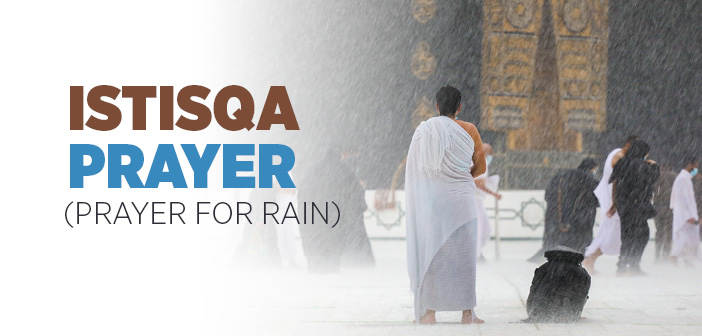What is the istisqa prayer? How to perform of istisqa prayer?
Once people complained to the Messenger of Allah about the lack of rain, so he gave orders for a pulpit, and when it was set up for him in the musalla,[1] he appointed a day for the people to gather. He came out on that day when the sun had just appeared and sat down on the pulpit. He extolled Allah’s greatness and praised Him. Then he said:
“You have complained of drought in your areas and of delay in receiving rain at the beginning of its season, but you have been ordered by Allah to supplicate Him and He has promised that He would answer your prayers.”
Then he said:
“All praise is for Allah, the Compassionate, the Merciful, the King of the Day of Judgment. There is no god but Allah Who does what He wishes. Dear Lord! There is no god except You. You are the Self-sufficient and we are the poor. Send down rain upon us and make it a source of strength for us and satisfaction for us.”
He then raised his hands and kept raising them till the whiteness of his armpits could be seen. After this, he turned his back to the people and inverted his cloak, keeping his hands raised. Finally, he faced the people, descended from the pulpit, and prayed two-rak’ahs. At that time Allah produced a cloud, thunder, and lightning. And, by Allah’s permission, it rained and before he reached the mosque there was flooding. Then he saw how quickly the people were running for shelter, he laughed until his molar teeth could be seen. He said:
“I bear witness that Allah has power over all things and I am Allah’s slave and Messenger.” (Abu Dawud, Istisqa, 2)
[1] Musalla means a wide area which is reserved for believers to perform Friday, holiday, and funeral prayers in congregation. During the early centuries of Islam, Muslims reserved such places outside their cities and there they performed Friday, holiday, and funeral prayers in congregation instead of separate mosques. Thus, the entire residents of a city were able to come together at least once a week.
Source: An Excellent Exemplar, Osman Nuri Topbaş, Erkam Publications





